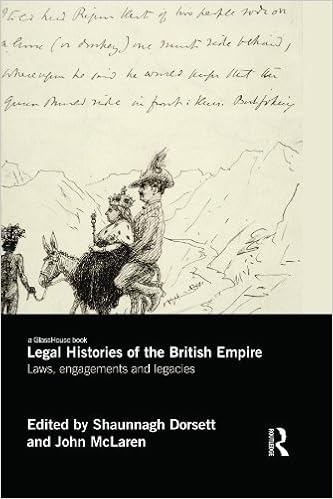(image source: Amazon)
The Legal History blog signalled the publication of the collective work Legal Histories of the British Empire. Laws, engagements and legacies (eds. Prof. dr. Shaunnagh Dorsett & Prof. em. dr. John McLaren) with Routledge back in 2014.Just as our American counterpart, the ESCLH blog omitted to signal this work at its publication, although we did divulge the call for papers of the initial conference at the National University of Singapore in 2012. The work is available for just £29,99 (paperback).
Book abstract:
This book is a major contribution to our understanding of the role played by law(s) in the British Empire. Using a variety of interdisciplinary approaches, the authors provide in-depth analyses which shine new light on the role of law in creating the people and places of the British Empire. Ranging from the United States, through Calcutta, across Australasia to the Gold Coast, these essays seek to investigate law’s central place in the British Empire, and the role of its agents in embedding British rule and culture in colonial territories. One of the first collections to provide a sustained engagement with the legal histories of the British Empire, in particular beyond the settler colonies, this work aims to encourage further scholarship and new approaches to the writing of the histories of that Empire. Legal Histories of the British Empire: Laws, Engagements and Legacies will be of value not only to legal scholars and graduate students, but of interest to all of those who want to know more about the laws in and of the British Empire.Table of contents:
On the editors:
Chapter One Laws, Engagements, and Legacies: the Legal Histories of the British Empire An Introduction, Shaunnagh Dorsett and John McLaren,
Part I – Framing Empire: People and Institutions,
Chapter Two Navigating the Scylla of Imperial Politico-Legal Aspirations and Charybdis of Colonial Micro-Politics in the British Empire: The Case of the Judges, John McLaren,
Chapter Three Asserting Judicial Sovereignty: The Debate over the Abolition of Privy Council Jurisdiction in British Africa, Bonny Ibhawoh,
Chapter Four Law, Culture and History: Amir Ali’s Interpretation of Islamic Tradition, Nandini Chatterjee, Chapter Five A Judicial Maverick: John Gorrie at Large in the Victorian Empire, Bridget Brereton,
Part II – Laws
Chapter Six Benjamin Knowles v. Rex: Judging Murder, Race and Respectability from Colonial Ghana to the Judicial Committee of the Privy Council, 1928-30, Stacey Hynd,
Chapter Seven Inventing Extraordinary Criminality: A Study of Criminalization by the Calcutta Goondas Act, Sugata Nandi,
Chapter Eight Sovereignties in Dispute: The Komagata Maru and Spectral Indigeneities, 1914, Renisa Mawani,
Part III – Engagements
Chapter Nine Imperial Legacies: Chartered Enterprises in Northern British America, Philip Girard
Chapter Ten Understanding ‘Chinese Customs’: Sinchew rulings in the Straits Settlements, 1830s-1870s, Stephanie Po-yin Chung,
Chapter Eleven Translating the Hedaya: Colonial Foundations of Islamic Law, John Strawson,
Chapter Twelve Travelling Laws: Burton and the Draft Act for the Protection and Amelioration of the Aborigines 1838 (NSW), Shaunnagh Dorsett,
Part IV – Legacies Chapter
Thirteen Legacies of Empire: Race and Labor Contracts in the Upper Mississippi River Valley, Allison Gorsuch,
Chapter Fourteen Empire on Trial: Slavery, Villeinage, and Law in Imperial Britain, Dana Rabin,
Chapter Fifteen Macaulay’s India Law Reforms and Labour in the British Empire, Barry Wright,
Chapter Sixteen A Slave Trade Jurisdiction: Attempts against the Slave Trade and the Making of a Space of Law (Arabo-Persian Gulf, Indian Ocean, Red Sea, circa 1820-1900), Guillemette Crouze
Shaunnagh Dorsett is Professor of Law at the University of Technology, Sydney. Her work focuses on Crown-Indigenous relations in colonial New South Wales / New Zealand and sovereignty formation in the first half of the nineteenth century.
John McLaren is Emeritus Professor of Law, University of Victoria, British Columbia. His research interests lie in the field of Canadian and Comparative Colonial Legal History. He has written widely and edited several books of essays in those fields.
More information on the publisher's website.
Please note that this book has been review in Comparative Legal History, the Society's journal (Volume II, Issue 2, pp. 325-334, PDF).







